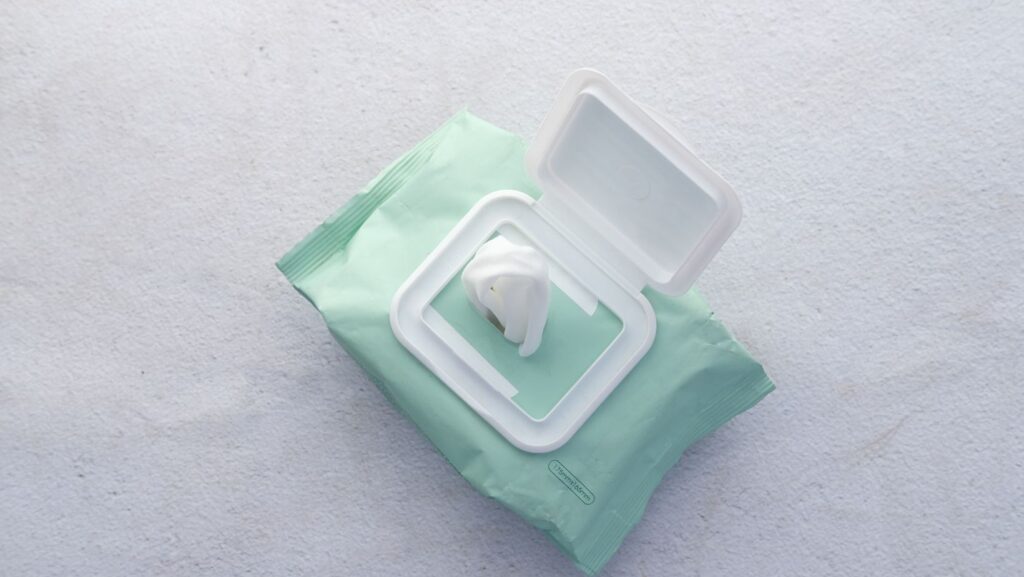In April, a UK-wide ban was introduced on wet wipes containing plastic. Though this ban is expected to come into play in April 2026, the UK is prepping for the incoming changes! Currently, the UK uses over 11 billion wet wipes per year, and in the pet care industry, over 14 billion were used in just 2021. Retailers like Boots, Tesco and Aldi have been supplying plastic-free wet wipes for human use, but until recently the pet care and veterinary industries have had no alternative. The plastics used in these wet wipes break down into dangerous microplastics that contain harmful chemicals that pollute the ground and water systems.
Why Wet-Wipes Including Plastic are Dangerous
The ban on wet wipes including plastics has followed an ongoing effort to make sure there is more investment and stronger regulation and enforcement across the water systems, helping tackle plastic and microplastic pollution and improve the water quality.
Microplastics
Polypropylene or plastic-based wet wipes break down into microplastics, which cause great harm to ecosystems and people.
Humans are exposed to microplastics through plastic products and water systems. For example, plastic packaging for products, fishing nets, wet wipes and hygiene products can all leave microplastics in the environment. Humans are then exposed to these microplastics by ingesting infected foods and drinks, direct contact and inhalation. Microplastics have infiltrated the entire food chain, starting from plankton and extending all the way through to whales. These tiny particles have now been found all across the globe, reaching even remote locations like Alaska! Additionally, scientists have now found microplastics in every part of the human body; including the brain, placenta, stomach and even breast milk.
These microplastics are not just present, but they are actively causing harm. In 2023 a study was conducted with mice. The mice were exposed to microplastics. In this study, drinking water for the mice was infected with tiny amounts of microplastics. Within three weeks the researchers found microplastics all over the mice’s bodies, alongside an extreme cognitive decline similar to dementia. In humans, these microplastics have been seen to cause fertility, cognitive, and respiratory problems. It’s worth noting that the breakdown of microplastics disrupts development and reproduction in humans and other animals.
A New Biodegradable Solution
Looking at the dangers of microplastics, it is clear why governments are working to reduce the use of unnecessary plastic products. However, the ban still left the veterinary and pet care industries with an issue since no company has been able to create a disinfectant wipe that meets industry standards, is non-plastic and is compliant with all biocidal regulations.
Byotrol, a multinational market leader in biocidal technologies, is the first to meet these industry standards with a regulatory-compliant, biodegradable and plastic-free disinfectant wipe for veterinary surfaces. The Professional Surface Disinfectant Wipes have just been launched under the ANIGENE brand widely used in animal health and welfare surfaces. ANIGENE professional surface disinfectant wipes are manufactured using a plastic-free 100% biodegradable substrate that deteriorates just 3 months after disposal.

ANIGENE wipes have been rigorously tested to European Standards for veterinary surface disinfectants as well as to the EN 16615 standard disinfectant wipe test, proving that plastic-free wipes are capable of exceptional efficacy when combined with Byotrol’s superior formulations. The wipes are certified as meeting the latest European veterinary tests for Product Type 3 (PT3) and have been designed specifically to answer the challenging needs of animal health and welfare environments.
Byotrol launched the wipes under Anigene at the London Vet Show 2024, extending their sustainability claims to their display, with a Quadrant2Design modular exhibition stand. The show took place from the 14th until the 15th of November 2024 and was absolutely jam-packed with veterinary professionals.
Byotrol hopes that this new launch will help the veterinary and pet care industry move forward with ease, alongside the incoming ban.
Summing Up
The shift towards biodegradable and plastic-free disinfectant wipes in the veterinary and pet care industries represents a significant step in addressing the pressing issue of plastic pollution. With the UK set to implement a ban on plastic-containing wet wipes by 2026, innovations like Byotrol’s ANIGENE Professional Surface Disinfectant Wipes offer a sustainable alternative that meets regulatory requirements and prevents harmful and unnecessary microplastics.

As we increasingly understand the detrimental effects of microplastics on ecosystems and human health, it is essential to adopt eco-friendly solutions throughout as many sectors as possible.
